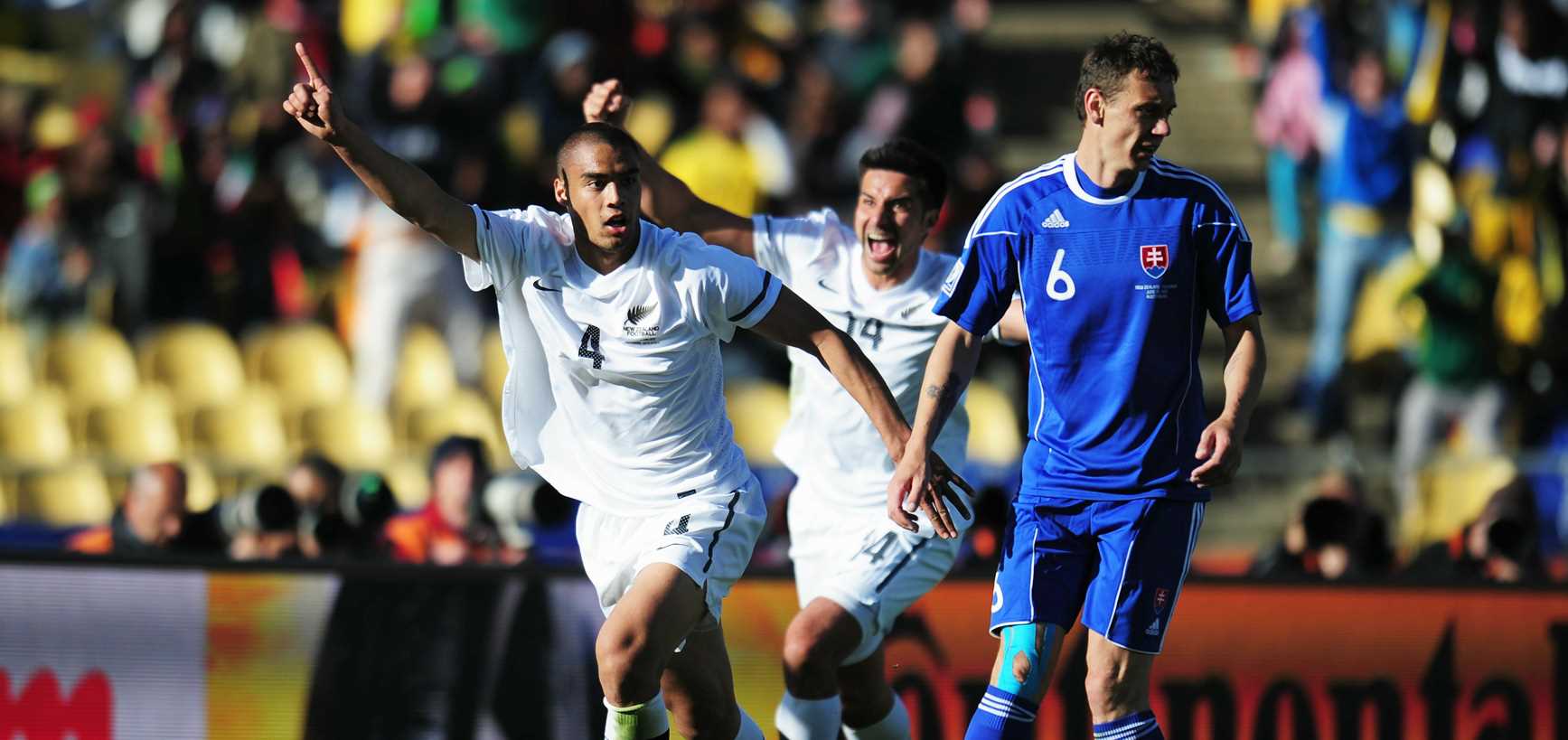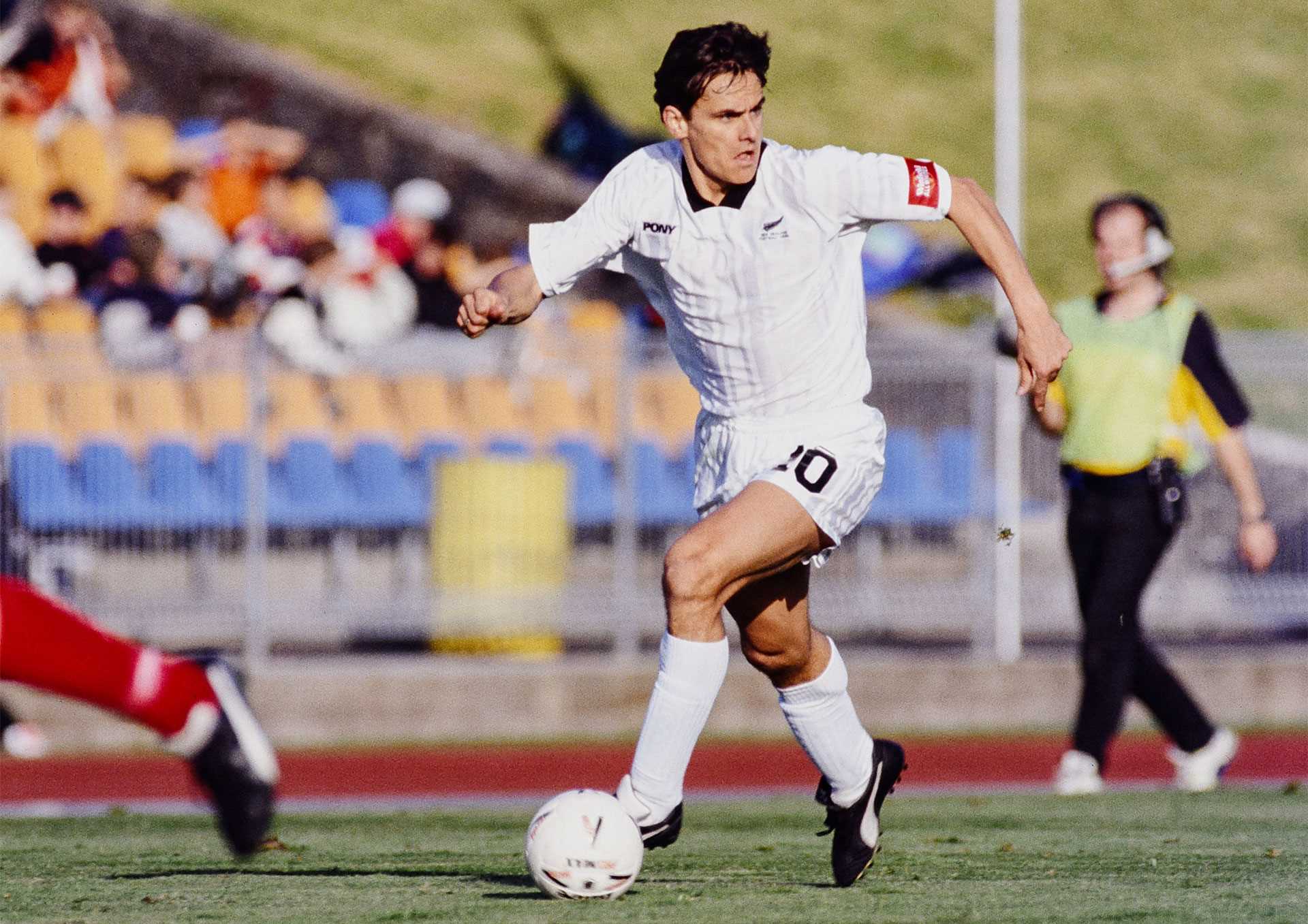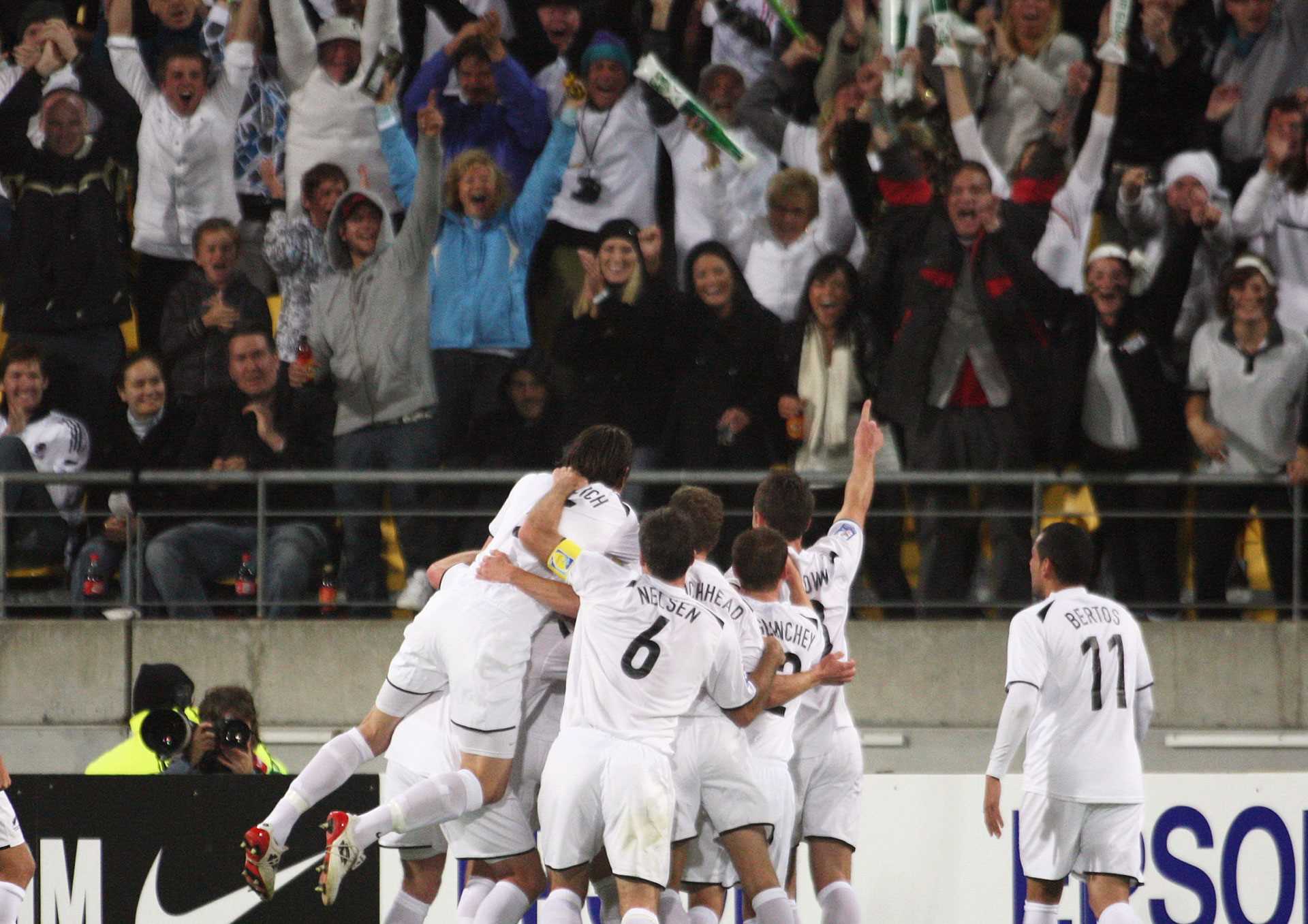ALL WHITES HISTORY

Written by Michael Burgess with support from the NZ Football Foundation
When the final whistle blew at Mbombela stadium on June 21 2010, Ryan Nelsen sunk to his knees.
For the All Whites’ captain, it was a moment of elation and exhaustion, as New Zealand had pulled off one of the great World Cup shocks, holding defending champions Italy to a 1-1 draw.
After the unexpected point against Slovakia, these were salad days for the All Whites, putting the Silver Fern in the footballing spotlight like never before.
“When I look back, to be able to play as well as you can at that level, and lead a bunch of guys, and bring the country on a journey as well, I’ll never forget that until the day I die,” says Nelsen. “That’s one of the proudest things, way more than the Premier League stuff.
“It is pretty crazy to get those results and perform the way we did. In the trenches, head down, fighting away. [But] internally we were really confident. That kind of confidence is easy to say, but hard to get.”
It was the undoubted high point of All Whites history, but Nelsen’s team was just another chapter of a legacy established across decades.
Fighting the odds has been a common theme for the New Zealand men’s team, over nearly 120 years of international competition. It’s rarely been easy competing in the global game from the bottom of the Pacific, but when the going gets tough…
The beginning
As far as New Zealand representative teams, it began on July 23, 1905 at the Caledonian Ground in Dunedin. Captained by local boy David McMilan, the team wore heavy white jerseys with a prominent black fern on the chest.
The touring New South Wales team trumped 1-0, followed by a 3-3 draw in Wellington.
The first overseas trip was a year later, with an 11-game tour of New South Wales, including three matches against the state side.
It was 17 years until New Zealand played again but it was a memorable occasion, with a 3-1 win over Australia in Dunedin. Goals from Southland’s Ted Cook (2) and Auckland’s William Knott secured victory in New Zealand’s first full international. Three weeks later the Kiwis sealed the series, in front of a 15,000 crowd in Auckland.
At high point of the decade was the 1923 tour of Australia, with Wellington’s George Campbell helping the tourists claim the “Ashes”, to much acclaim from media on both sides of the Tasman.
There was limited activity over the next two decades, with visits from Chinese Universities (1924), Canada (1927) and England Amateurs (1937) along with tours to Australia (1933 and 1937). The powerful English team were the pick of the visitors – going unbeaten – while the 1933 Australian trip was notable for the team performing a pre-match haka, wearing black jerseys.
Post Second World War.
A tour by South African was the major event of the late 1940s, with the Springboks completing a 4-0 series sweep. The 1950s saw the first trips to the Pacific, for matches against Fiji, Tahiti and New Caledonia and a Hong Kong team visit New Zealand. But a trip by FK Austria in 1957 had the biggest impact, with the sparkling football of the Vienna team.
In 1961 an England F.A team including the legendary Tom Finney and a young Bobby Moore captivated the football public here, beating the Ken Armstrong coached New Zealand side convincingly in both internationals.
A 1964 `world’ tour was ahead of its time, with 15 games across Hong Kong, Thailand, Iran, Germany, Switzerland, England and the United States.
It was a tall order, with opposition including FC Basel, Nottingham Forest and an England XI. At one stage Bert Ormond’s team faced four matches in nine days, but they at least finished on a high, with a 5-2 win over San Francisco.
Kiwi footballers faced two immense challenges in 1967. Reigning English League Champions Manchester United, featuring Bobby Charlton, George Best and Denis Law, were probably the best team to visit this country and managed 11 goals without reply in Christchurch.
In November the NZFA accepted an invitation to play a tournament in Saigon, in the midst of the Vietnam war. New Zealand performed credibly, including a 3-1 win over Singapore, but it was an uncomfortable experience for many.
New Zealand’s first foray into FIFA World Cup qualifying came in 1969, with a two-leg playoff against Israel. Unfortunately, due to financial reasons, both games were staged in Tel Aviv, in front of massive, partisan crowds. Grahame Bilby’s team fought manfully, against a team containing several European professionals, but went down 0-4 and 0-2.
1970s
New Zealand played 80 matches across the decade, from club teams like Sunderland, Norwich City, Ipswich Town and Dundee, to the first internationals against China and South Korea.
Qualifying for the 1974 FIFA World Cup saw New Zealand grouped with Australia, Indonesia and Iraq. The All Whites grabbed two draws against the Socceroos (1-1 and 3-3) but could only claim one further point in their other four matches.
Four years later the All Whites again fell at the first World Cup qualifying hurdle, finishing behind Australia.
In 1978 Bobby Robson brought a strong England B team to these shores, with a 3-1 loss in Wellington the best effort by the All Whites.
Probably the most significant result came on June 13, 1979, when a Duncan Ormond goal secured the first victory over Australia in 25 years. It was John Adshead’s second match as coach, accelerating his eventual appointment for the 1982 World Cup campaign.

Wynton Rufer playing for the All Whites | Credit Photosport NZ
1980’s
The first time New Zealand truly stunned the football world came in August 1980, when goals from Brian Turner (2), Steve Wooddin and Grant Turner shocked Mexico 4-0 at Bill McKinlay Park.
That raised hopes for the impending World Cup campaign, though no one could have anticipated such an incredible journey.
The flashpoint of the eight game initial phase was a 2-0 win over Australia at the Sydney Cricket Ground, capped by a wonderful Grant Turner goal, which propelled the All Whites into the second round with Kuwait, Saudi Arabia and China.
What followed captivated the nation, as football’s profile matched any other sport, including rugby. Crowds of 30,000 flocked to Mt Smart, with the charismatic Adshead aiding heavy media coverage.
After a positive start, a controversial defeat to Kuwait and a costly home draw with Saudi Arabia left the All Whites with a seemingly impossible mission; beat Saudi Arabia by five clear goals, on a plastic pitch in searing Riyadh heat.
The miracle was achieved, thanks to first half goals by Wynton Rufer (2) Brian Turner (2) and Wooddin, booking a playoff with China for the last World Cup spot.
That night in Singapore is one of the greatest achievements in All Whites’ history, as they defied a late Chinese onslaught and a partisan crowd to win 2-1, with goals from Wooddin and Rufer.
“The biggest nation in the world has just been done by the smallest” said a gleeful assistant coach Kevin Fallon.
The Road to Spain had encompassed 14 matches, spread across nine months, with eight wins, five draws and a solitary loss. The All Whites scored 42 goals, including a record 13 against Fiji, and conceded just nine.
Their first bow on the biggest stage featured a brave comeback from 0-3 down against Scotland, before they pulled away to win 5-2, with Sumner and Wooddin finding the net for New Zealand.
The performance against the USSR, who boasted Rinat Dasayev and Oleg Blokhin, was also credible, as the Europeans prevailed 3-0.
Socrates, Zico and Falcao helped a full strength Brazil to a 4-0 victory in the final match, with Zico’s bicycle kick an overriding memory.
After that incredible high, the rest of the decade was more piecemeal. There were double victories over Australia and Japan in 1983 and tours by Newcastle United (featuring Paul Gascoigne), Dynamo Minsk and IFK Gothenburg were well received.
A 3-1 victory over Israel – featuring a geometry defying goal by Colin Walker was the best moment of the 1986 World Cup qualifying campaign, but defeats in Sydney and Tel Aviv ended any hopes.
Four years later away results were again terminal, including a 0-1 loss in Israel, though a superb 2-0 win over the Socceroos at Mt Smart provided some late joy.
1990s.
For the NZFA’s centenary in 1991, there was the best possible present; a visit by the full England side. The All Whites were superb at Mt Smart, against a team that had six players who featured in the 1990 World Cup semi final and only a late Gary Lineker goal denied them an improbable draw, before they went down 0-2 in the capital.
The All Whites had five different coaches across the decade, with Ian Marshall, Bobby Clark, Keith Pritchett, Joe McGrath and Ken Dugdale.
Both the 1994 and 1998 FIFA World Cup qualifying campaigns ended at the second hurdle, eliminated by Australia after a home and away series.
A high point came at the 1999 Confederations Cup in Mexico, after qualifying at the expense of Australia. Dugdale’s team won respect with solid performances against USA (1-2) and heavyweights Germany (0-2) and Brazil (0-2), with Chris Zorocich’s long range strike against the Americans a moment to savour.
Other highlights included a 2-2 draw with Uruguay in 1995, the first result achieved on South American soil, while an eight-match tour of Britain in 1992 yielded wins over Celtic and Brighton. Rufer brought his Werder Bremen side to New Zealand for three matches in 1992.
2000’s
The All Whites’ path to the 2002 World Cup was curtailed by Australia, but they trumped the Socceroos to qualify for the 2003 Confederations Cup.
A 1-1 draw with Scotland in Edinburgh en route was promising but the tournament saw defeats to Japan (0-3), Colombia (1-3) and the European champions France (0-5).
A third place finish at the 2004 Oceania Nations Cup ended any dreams of qualifying for the subsequent World Cup and commenced a fallow period, with only one match in the next 18 months.
Ricki Herbert’s reign had some positive early results (vs Georgia 3-1; vs Estonia 1-1; vs Wales 2-2), before an historic 0-0 draw with Iraq at the 2009 Confederations Cup.
In the absence of Australia, now part of the Asian Football Confederation, the All Whites were Oceania’s representatives in the World Cup playoff with Bahrain. Some heroic defending gained a vital 0-0 away draw, setting up the ‘one shot for glory’ match in Wellington.
It became one of the greatest nights in All Whites’ history, engendering probably the best atmosphere ever witnessed at a New Zealand sporting event, with fans creating a sea of white.
Rory Fallon’s bullet header just before halftime gave a vital lead, before 45 minutes of indescribable tension. Mark Paston’s penalty save preserved the advantage, before the final whistle sparked pandemonium, in front of the biggest crowd for a football match in this country.
With the squad bolstered by the arrival of Winston Reid and Tommy Smith, a 1-0 win over Serbia was the best result of a tough build-up, ahead of 10 days in South Africa that stopped the nation.
Reid’s 93rd minute header, from a wonderfully crafted cross by Shane Smeltz, claimed a deserved 1-1 draw with Slovakia, splashing football across the media in a way not seen since 1982.
But that was only the entrée, as four days later the All Whites held the Azzuri 1-1, thanks to a Smeltz finish and a magnificent defensive effort, led by Paston and Nelsen, earning generous praise from the world’s media.
The journey ended with a 0-0 draw against Paraguay, though the All Whites left South Africa unbeaten. They were honoured as ‘team of the year’ at the Halberg Awards, with Herbert taking the coaching gong.

Players celebrating Rory Fallon's goal against Bahrain | Credit Photosport NZ
Beyond 2010
If South Africa was the apex of Herbert’s tenure, the shock third place finish at the 2012 Oceania Nations Cup was the nadir, with Tahiti gaining the golden ticket to the Confederations Cup.
The All Whites again reached the intercontinental playoff for the World Cup but faced Mexico, after the North American giants had missed automatic qualification.
A difficult assignment became near impossible with the loss of Reid (injured), leading to a 5-1 defeat in the Azteca Stadium cauldron – with keeper Glen Moss a standout – followed by a 4-2 reverse in Wellington, with goals to Rory Fallon and Chris James.
Anthony Hudson followed Herbert as the 19th coach of the All Whites. He prioritised youth and capped an unprecedented number of players. His tenure featured a 1-1 draw with the USA in Nashville and a scintillating performance in a 2-1 defeat against Mexico at the 2017 Confederations Cup.
After navigating a path through Oceania, the All Whites met Peru for a place at the 2018 World Cup. It was a riveting series. The tense first leg ended 0-0 on a sunny Saturday afternoon in Wellington, with Ryan Thomas narrowly missing a late chance and substitute Chris Wood causing problems.
The build up to the return fixture was incredible, as Lima came to a standstill. It was frenetic and feverish, with colourful witch doctors congregating outside the stadium to put curses on the visitors, and Peruvian Air Force jets swooping above the All Whites team hotel. A goal in each half sealed the tie for the Andean nation, with the All Whites compromised by a gruelling travel schedule and a partially fit Wood.
The decade ended on a promising note, with Danny Hay’s young team playing some sparkling football in Dublin, taking the lead before going down 3-1 to the Republic of Ireland.
Hay has a golden generation, with a record number of European based players, hoping to continue the legacy of the silver fern on the world stage.
New Zealand Football Inc
Football House, North Harbour Stadium,
Stadium Drive, Albany,
Auckland, New Zealand
© Copyright New Zealand Football. All rights reserved.

Sign up to our fan newsletter:
 Admin Login
Admin Login